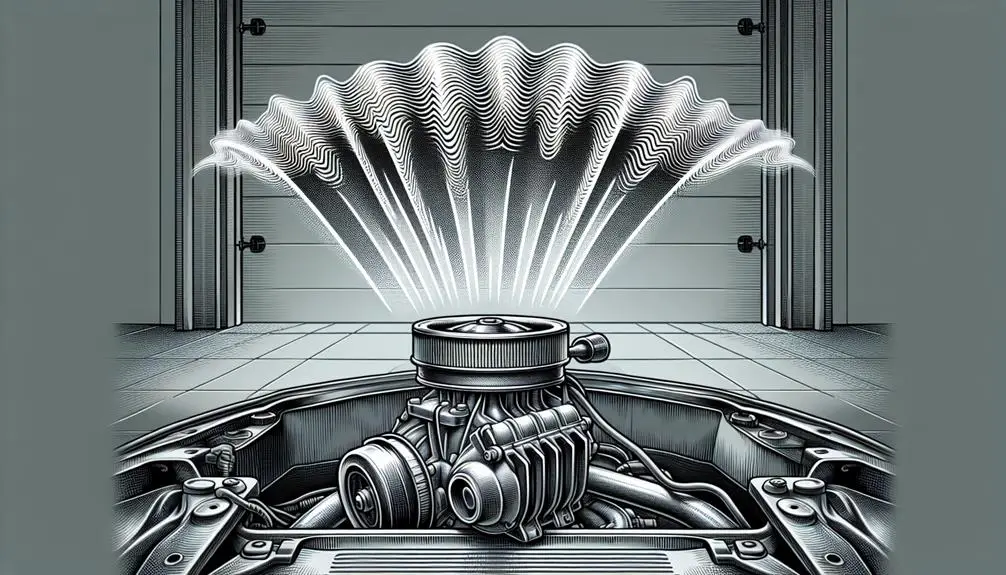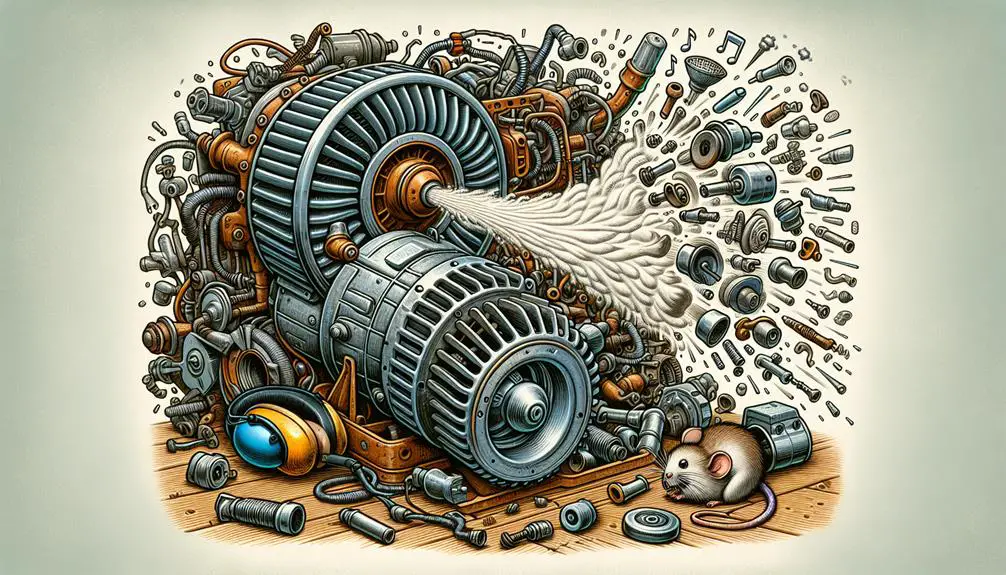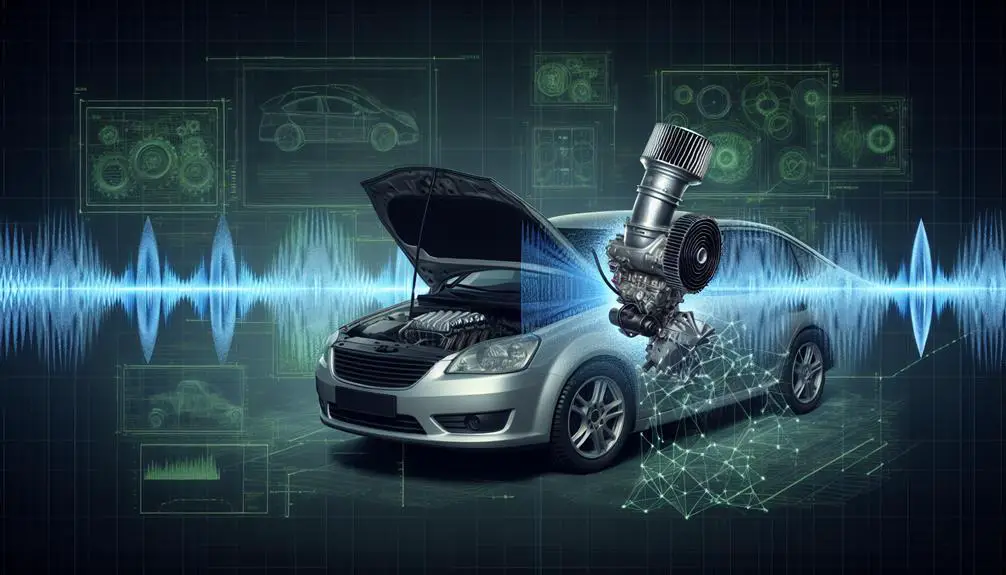A bad blower motor can sound like:
- whirring
- clicking
- rattling
Identifying Whirring Noises

If your car's blower motor starts to sound off, you might pick up on a distinct whirring noise that shouldn't be ignored. This sound is a telltale sign that your blower motor is beginning to fail. It's important to address this issue promptly to avoid further damage to your vehicle's heating and cooling system.
You'll usually notice this whirring noise more when you're using the air conditioning or heating system. It might start off faintly but can quickly escalate in volume as the problem worsens. The noise is caused by the blower motor struggling to operate normally due to wear and tear or debris obstructing its movement. As you crank up the fan speed, the whirring might become more pronounced, giving you a clearer indication that something's amiss.
Don't brush this sound off as a minor annoyance. It's your car telling you it needs attention. Ignoring it could lead to the blower motor completely failing, leaving you without a functioning heater or air conditioner when you most need it. Moreover, operating a faulty blower motor can strain other components of your vehicle's HVAC system, leading to more expensive repairs down the line.
Taking action as soon as you hear these whirring noises can save you time and money. It's advisable to consult with a professional mechanic who can accurately diagnose the issue. They'll determine if the blower motor needs cleaning, repair, or outright replacement. Acting quickly ensures you maintain a comfortable and safe environment inside your car, regardless of the weather conditions outside.
Rattling Sounds Explained
While addressing whirring noises is important, you shouldn't overlook the significance of a rattling sound coming from your car's blower motor.
Rattling sounds often signal loose or deteriorating components within the blower motor assembly. Imagine you're driving, and suddenly, there's this unsettling rattle emanating from the dashboard. It's not just annoying; it's a red flag. These sounds typically arise when the motor's mounting has loosened, allowing parts to jostle against each other or the vehicle's frame. It's akin to a loose bolt in a machine; everything might still function, but the integrity is compromised.
What's more, debris accumulation can lead to rattling. Leaves, twigs, or even small pebbles can find their way into the blower motor housing through the external air intakes. As the motor spins, these foreign objects can get tossed around, creating a noise that's hard to ignore. It's not just a sound issue; this debris can further damage the motor and reduce its efficiency.
Addressing a rattling sound sooner rather than later is your best bet. Ignoring it could transform a simple fix—like tightening a bolt or cleaning out debris—into a costly motor replacement. Don't just turn up the radio to drown it out. Take the time to investigate or have a professional look at it. It's about ensuring your ride isn't only comfortable but safe and sound.
The Squeaking Issue

Beyond rattling, you might further notice a persistent squeaking sound coming from your car's blower motor, indicating another issue that shouldn't be ignored. This squeaking isn't just a minor inconvenience; it's a clear sign that your vehicle's blower motor is struggling and might need immediate attention. Unlike rattling, which can suggest loose components, squeaking often points towards more specific problems.
The squeaking sound generally indicates friction or a lack of lubrication within the blower motor's moving parts. Over time, these components can wear down, leading to a higher pitch and often persistent squeak. Ignoring this can lead to more significant damage, not just to the blower motor but potentially impacting other parts of your vehicle's HVAC system.
Here are five critical points to take into account about the squeaking issue:
- Lack of Lubrication: Bearings inside the motor may have dried out, requiring lubrication.
- Worn Components: Parts of the motor might be worn out, needing replacement or repair.
- Misalignment: Sometimes, components can become misaligned, causing them to rub against each other.
- Debris: Small pieces of debris caught in the motor can also cause squeaking sounds.
- Age: Older blower motors are more prone to squeaking because of wear and tear over time.
Addressing the squeaking sound sooner rather than later can save you time and money. It's often a more straightforward fix, such as applying lubricant or removing debris. However, ignoring it could lead to a complete blower motor failure, necessitating a much costlier solution.
Hums and Buzzes
Another common issue you might encounter with your vehicle's blower motor is a humming or buzzing sound, indicating potential electrical problems.
When you hear these sounds, it's important to not brush them off as minor annoyances. They're often the initial sign that your blower motor is struggling due to electrical issues, such as faulty wiring or a deteriorating motor capacitor. These components are vital for the proper operation of your blower motor, and when they malfunction, they can produce a distinct hum or buzz.
If the sound gets louder when you increase the fan speed, it's a clear indicator that the issue is directly related to the blower motor's electrical system. This escalation in noise is because the motor drawing more power in an attempt to function, which in turn worsens the underlying electrical problem.
You'll want to address this issue promptly. Ignoring it can't only lead to a complete failure of your blower motor but can also pose a risk of electrical fires. Early intervention can save you from more costly repairs down the line.
To diagnose and fix the problem, it's best to consult with a professional. They can accurately determine whether the noise is due to a failing motor, loose wiring, or other electrical issues. Fixing it might involve replacing the motor capacitor, securing loose connections, or, in more severe cases, replacing the blower motor itself.
Clicking Noises Decoded

Moving from electrical sounds, you might additionally notice a clicking noise, indicating a different issue with your vehicle's blower motor. This sound shouldn't be ignored, as it often points to specific problems that, if addressed early, can save you from more significant repairs down the line. Understanding what these clicking noises mean can help you diagnose and rectify the issue more effectively.
Here are the primary reasons you might hear a clicking sound from your blower motor:
- Debris in the system: Small objects or build-ups can get trapped in the blower motor, causing a clicking sound as the fan blades hit them.
- Loose components: Parts of the blower motor assembly can become loose over time, leading to a clicking noise as they knock against each other.
- Worn bearings: The bearings allow the blower motor to operate smoothly. When they wear out, you'll likely hear a clicking or grinding noise.
- Faulty relay: A damaged relay can intermittently disrupt power to the blower motor, causing a clicking sound as it attempts to engage and disengage.
- Damaged fan blades: If the fan blades are bent or broken, they can hit other parts of the motor or housing, creating a clicking noise.
If you're hearing these noises, it's essential to investigate further or consult a professional. Ignoring these sounds can lead to a complete failure of your blower motor, which is essential for your vehicle's heating and cooling system. Early detection and repair can prevent more costly fixes in the future.
Conclusion
In vital, if you've noticed strange sounds coming from your HVAC system, it's likely your blower motor's signaling for help. Whirring, rattling, squeaking, humming, or clicking noises can all indicate different issues.
Don't ignore these auditory red flags. Each sound suggests a unique problem, from loose parts to severe motor damage.
It's important to address these issues promptly to keep your system running smoothly and avoid more significant, costly repairs down the line.
